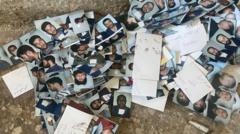In a quiet neighborhood cemetery in Adra, Syria, Khaled al Hamad digs up bags containing human remains, holding on to hope that they may provide answers about his brothers who mysteriously vanished a decade ago under Bashar al-Assad's regime. This eerie scene reflects the harrowing experience of countless families searching for their loved ones who disappeared into the dark corners of Assad's prison system, with recent discoveries igniting both hope and despair.
These bags, discovered in the aftermath of Assad's forces fleeing, bear names and numbers, signaling a potential link to the regime's violent history. Authorities and human rights advocates are eager to investigate the findings, as similar reports of remains have emerged from areas previously under government control. "Some people were taken to an area called 'the driving school' and liquidated there," Khaled relates, sharing his worst fears about his brothers' fate.
As the Syrian civil war reshapes the political landscape, families are finding the courage to confront the bitter realities of the past. Tens of thousands remain unaccounted for, with stories of military torture and untold abuse surfacing from the shadows of sites like the Mazzeh military airbase. Eyewitnesses, including members of recently ascendant groups like Hayat Tahrir al-Sham (HTS), describe gruesome torture methods employed by Assad's forces, shedding light on horrific practices such as electrocution and sexual violence used against prisoners.
The period of uncertainty following Assad’s regime has compelled families, like that of Mahmoud Saed Hussein, to sift through piles of grim photographs and records in hopes of uncovering the truth behind their loved ones' fates. As the mother of Mahmoud expresses her agony, "These are all like my son... May God burn Assad's heart, as he has burned ours."
Researchers and human rights advocates warn that crucial evidence documenting the regime's brutality risks being lost amid the chaos as civilian search efforts intensify. Additionally, analysts raise concerns about international complicity and the real consequences of policies such as extraordinary rendition, which have, at times, led to torture in confounding partnerships between governments.
The airbase once filled with the stench of torture now lies littered with remnants of conflict and a desperate desire for closure. As newfound hope unfurls among families once silenced by oppression, young insurgents like the HTS fighter boldly confront the past, signaling a societal shift toward a future free from Assad's dictatorial grip. However, the unanswered questions linger—both about the fate of the missing and the evolving dynamics of Syria's complex political landscape.

















